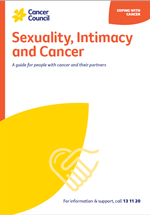- Home
- About Cancer
- Cancer treatment
- Radiation therapy
- Managing radiation therapy side effects
- Sexuality, intimacy and fertility issues
- Effects on sex and fertility
Effects on sex and fertility
Radiation therapy to the abdomen, pelvis and reproductive organs can affect your sexual function and ability to have children.
Learn more about:
Changes to the vagina
- Radiation therapy to the vulva or vagina may cause inflammation, making intercourse painful. This usually improves in the weeks after treatment ends. Your treatment team will recommend creams and pain relief to use until the skin heals.
- Talk to your doctor about using vaginal moisturisers, which may help with discomfort. In some cases, oestrogen creams are prescribed.
- The vagina may become shorter and narrower (vaginal stenosis), making intercourse difficult or painful. Having regular intercourse or using vaginal dilators after treatment ends can help keep the vagina open. Wait until any soreness or inflammation has settled before you start using a dilator or having sex. This is usually 2–6 weeks after your last session of radiation therapy. Using a dilator can be challenging. Your doctor, nurse or a physiotherapist can provide instructions.
- If sexual penetration is painful or difficult, explore other ways to orgasm or climax.
Menopause
- Radiation therapy to the pelvic area or abdomen usually stops the ovaries producing female hormones, which leads to early menopause.
- Your periods will stop and you may have menopausal symptoms. These may include hot flushes, dry skin, vaginal dryness, mood swings, trouble sleeping (insomnia) and tiredness.
- If vaginal dryness is a problem, take more time before and during sex to become aroused. Using lubrication may also make intercourse more comfortable.
- Discuss changes to your libido with your partner so they understand how you’re feeling.
- Ask your GP to arrange a bone density test to check for osteoporosis or osteopenia, which can develop after menopause.
- Talk to your doctor about ways to manage the symptoms of menopause. If you need support resuming sexual activity, ask your doctor for a referral to a sex therapist or psychologist.
Sperm and erection problems
- Radiation therapy to the pelvic area or near the testicles may temporarily affect how much sperm you make. You may notice that you feel the sensation of orgasm but ejaculate little or no semen. This is known as dry orgasm. It may be temporary or permanent.
- Depending on the dose and the area of the pelvis treated, you may have trouble getting and keeping an erection firm enough for intercourse. This is called erectile dysfunction or impotence. Sometimes impotence may be permanent.
- In some cases, you may experience pain when ejaculating. The pain usually eases over a few months but may be permanent.
- Talk to your treatment team if erection problems are ongoing and causing you distress. They can suggest ways to keep your penis erect, such as prescription medicines, penile implants or vacuum erection devices.
Infertility
- Sometimes, changes to sperm production and ability to have erections are permanent. This may cause infertility. If you want to have a child, you may choose to store sperm before treatment starts. Your partner can use this sperm to conceive through artificial insemination or in‑vitro fertilisation in the future.
- If radiation therapy causes menopause, you will no longer be able to become pregnant. If you wish to have children in the future, talk to your radiation oncologist before treatment starts about ways to preserve your fertility, such as storing eggs or embryos or freezing ovarian tissue.
- If your ovaries don’t need to be treated, one or both of the ovaries may be surgically moved higher in the abdomen and away from the field of radiation. This is called ovarian transposition or relocation (oophoropexy). It may lower the amount of radiation your ovaries receive and it may help them keep working properly.
→ READ MORE: Life after radiation therapy
Podcast: Sex and Cancer
Listen to more of our podcast for people affected by cancer
More resources
A/Prof Susan Carroll, Senior Staff Specialist, Radiation Oncology, Royal North Shore Hospital, and The University of Sydney, NSW; Katie Benton, Advanced Dietitian Oncology, Sunshine Coast Hospital and Health Service, QLD; Adrian Gibbs, Director of Physics, Radiation Oncology, Princess Alexandra Hospital Raymond Terrace, QLD; Sinead Hanley, Consumer; Dr Annie Ho, Radiation Oncologist, GenesisCare, Macquarie University Hospital and St Vincent’s Hospital, NSW; Angelo Katsilis, Clinical Manager Radiation Therapist, Department of Radiation Oncology, Royal Adelaide Hospital, SA; Candice Kwet-On, 13 11 20 Consultant, Cancer Council Victoria; Jasmine Nguyen, Radiation Therapist, GenesisCare Hollywood, WA; Graham Rees, Consumer; Nicole Shackleton, Radiation Therapist, GenesisCare Murdoch, WA; Dr Tom Shakespeare, Director, Cancer Services, Mid North Coast Local Health District, NSW; Gabrielle Vigar, Nurse Lead, Cancer Program, Royal Adelaide Hospital and Queen Elizabeth Hospital, SA.
View the Cancer Council NSW editorial policy.
View all publications or call 13 11 20 for free printed copies.

